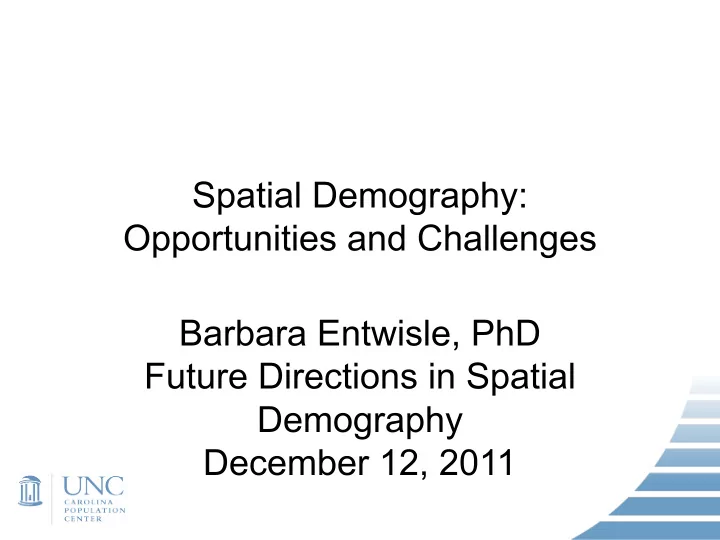

Spatial Demography: Opportunities and Challenges Barbara Entwisle, PhD Future Directions in Spatial Demography December 12, 2011
US Census 2010 Standard Hierarchy of Census Geographic Entities
Boundaries and Mobility Immigration § Migration § Residential mobility § One year, five years, lifetime § Life history calendars §
Game-Changer #1: Geographic Information Systems Mapping tools – spatial patterning as a source of § insight Locational data – new approaches to data § integration, measurement Remote sensing – new approaches to human- § environment interactions
Putting People Into Place Barbara Entwisle March 30, 2007
Standard approach to conceptualization and analysis of link between micro and macro: example Thomas A. Glass and Matthew J. McAtee. 2006. “Behavioral science at the crossroads in public health: Extending horizons, envisioning the future.” Social Science and Medicine 62:1650-1671.
Challenge: A fully dynamic conceptualization of place People in place § People acting on place § People choosing place § Dynamic implications §
Game-Changer #2: Torrents of Data
Web Search Interest: “big data”
Types of Data Census and survey data § Registration data § Administrative data § Transactional data § Internet data (Tweets, Searches, Etc.) §
Identifiers and Linkages (rearranging HIPAA) Name § Location § Contact information § Record numbers § Device numbers § Biometrics/images/etc. §
US Census 2010 Standard Hierarchy of Census Geographic Entities
Selected Challenges Integration of diverse data sources § Documentation (given dynamic quality) § Quality assessment § Privacy/confidentiality § Data management §
Demographers’ Toolkit 20th Century 21st Century Mathematics Mathematics Statistics Spatial Science Survey Methodology Data Science
Contributions to Population Change, Diversity, and Distribution Mortality § Fertility § Migration § Temporal scale (day, week, month, year, decade, § century) Sociospatial scale (street, neighborhood, § community, state/province, nation, globe)
Potential New Areas for Exploration (Selected) Life course transitions and spatial mobility § Social mobility and spatial mobility § Neighborhoods and migration § Social networks and migration § Tourism and ecological impact § Distribution, mobility, and implications of climate § change
Recommend
More recommend